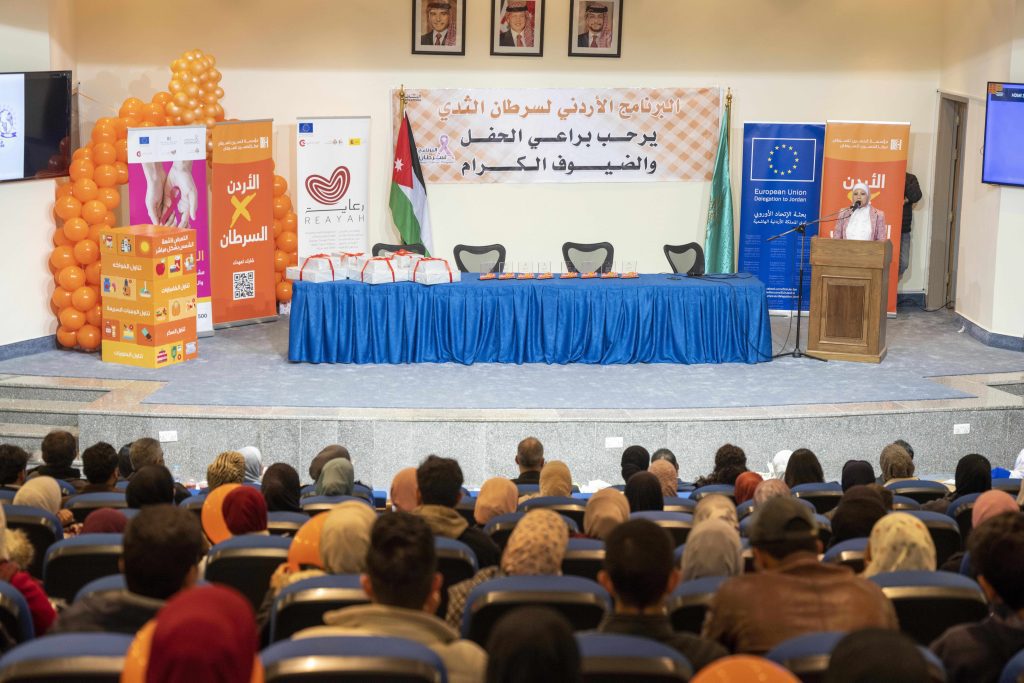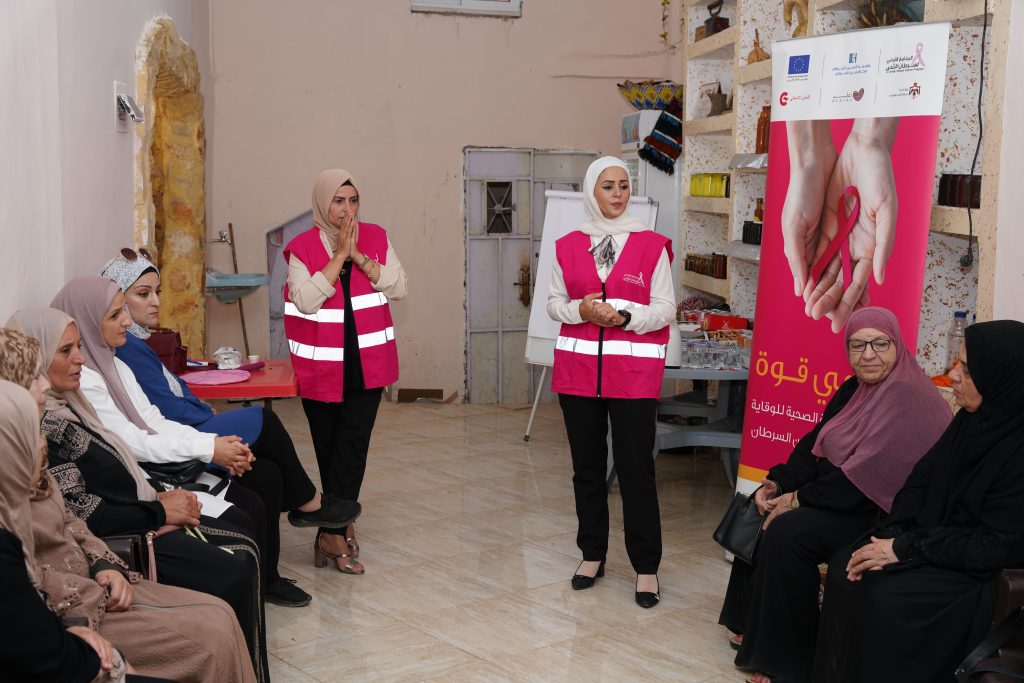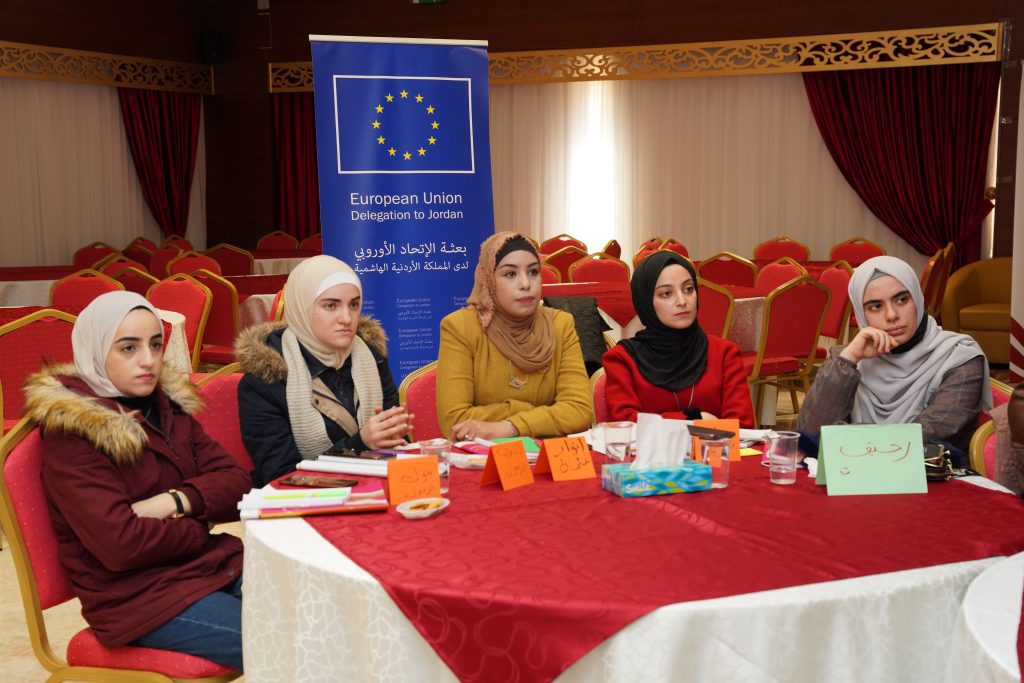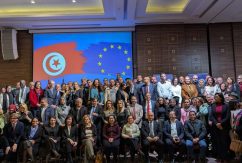Awareness is Power: Jordan Breast Cancer Programme Empowers Communities Across the Kingdom
In the quiet hills of Mafraq, Tafilah, and Ajloun across Jordan, a shift is unfolding. It’s not through a traditional infrastructure project or an economic initiative; this change is happening inside people’s homes, community centres, and local health clinics.
This is the result of the “Awareness is Power” project, implemented by the Jordan Breast Cancer Programme (JBCP) with crucial support from the European Union under the REAYAH initiative, managed by AECID.
Launched with the aim of improving awareness of the most common cancers affecting women, the project has left an indelible mark on the local communities across Jordan. But, beyond its immediate goals of education and awareness, it has also brought about economic empowerment, fostered leadership among women, and sparked a deeper conversation around women’s health in Jordan.

“Local Champions” for Cancer Awareness Across Jordan
The heart of the ‘Awareness is Power’ initiative lies in the hands of local women who have risen as champions of health education. In collaboration with 45 community organisations, the programme has selected and trained local volunteers to become health educators. These inspiring women, many of whom had never been in positions of influence before, now carry the torch of cancer awareness across their communities.
One of them, Fatima Al Omari, speaks of her experience delivering awareness-raising sessions, ultimately contributing to a growth in life-saving actions.
“Through this programme, I was able to enhance my skills in delivering health messages related to cancer prevention and early detection. With other educators, we were able to reach women in remote areas who may not have had access to such vital information otherwise.”
The training model used by the project was thorough. 73 community educators were trained through a series of workshops and activities, becoming able to deliver 3,400 targeted lectures and over 1,500 home visits.
“The programme focused on grassroots efforts, employing community health workers (CHWs) to engage with women in their homes. Meanwhile, mass national campaigns reaching more than a million people across the Kingdom ensured that the message of early detection and cancer prevention was heard loud and clear,” explains Rasha Fakheraldeen, Head of Communication at the Jordan Breast Cancer Program/ King Hussein Cancer Foundation and Centre.

Reaching Remote Areas: A Life-Saving Initiative for Women
While urban centres in Jordan may have more access to healthcare, it is in the rural and remote areas where the ‘Awareness is Power’ initiative has been most transformative. Women in these areas often face significant barriers to healthcare—whether it be due to geographic isolation, cultural norms, or a lack of awareness about available services.
Aware of this reality, the European Union has helped facilitate research studies to assess the impact of the programme and better understand public attitudes towards cancer prevention in Jordan. “These studies revealed crucial insights, such as the social and cultural barriers preventing women from seeking early detection services, which should allow future projects to target these barriers more effectively,” explains Francesc Vila Pala, Programme Manager at AECID, the Spanish Cooperation Agency implementing the REAYAH initiative.
In Ajloun, in northern Jordan, a nurse working with the programme reported a soaring demand for breast exams and pap smears in her clinic, thanks to the awareness efforts.
“In just a few months, our clinic had performed 62 pap smears and 18 breast exams; life-saving tests that were rarely requested before the JBC started,” she rejoices.
Reaching even the most isolated homes with critical information about cancer prevention, the JBC has also empowered young women in remote areas.
Hala*, a young Syrian left out of the formal education system, was selected as a community health worker as part of the programme. Initially struggling with the technical content and pace of the training, she managed not only to complete the course but also excelled in both her technical knowledge and her role as a communicator.
“Today, she is an active member of the CHWs team. She is truly great in her role and inspires confidence in others,” Rasha says.

From uncertainty to confidence: a future of empowered communities
Hala’s journey mirrors the broader goal of the project: to empower women not only with knowledge but also with the self-assurance to make a difference in their communities.
As the EU support to the project comes to an end, young volunteer Rania* shares her passion for her work: “I joined this initiative as I wanted to spread awareness of the importance of early and periodic detection of cancer to the women in my community.”
“It’s empowering to know that my actions can help save lives.”
Rania’s work, alongside dozens of other youth volunteers, involved organising public events, conducting peer-to-peer education sessions, and helping to engage more than 3,000 people through community-based activities. Free medical days, bazaars, and competitions contributed to raising awareness of the Non-Communicable Diseases but also provided economic opportunities for local women.
“By giving local women the tools to educate and advocate for health, and by creating opportunities for youth to engage in meaningful work, the programme has fostered a sense of ownership and responsibility that will last long after the final awareness campaign has ended,” the JBC representatives state.
As Fatima Al Omari puts it: “This programme has not only given us knowledge, but it has also shown us the power we have to make a difference in our communities. Together, we are raising awareness and saving lives.”
*Names have been changed for anonymity reasons.





























 Syria
Syria 


